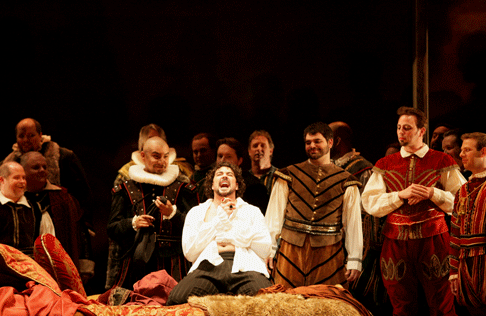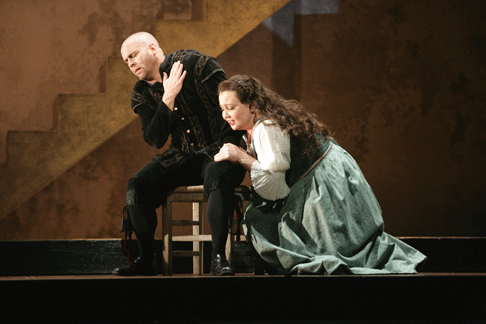19 Apr 2009
Shagimuratova steals show in HGO’s Rigoletto
On a stormy evening in Houston (both in and outside of the house), Houston Grand Opera’s opening night production of Verdi’s Rigoletto went off with a thunderous bang.

On a stormy evening in Houston (both in and outside of the house), Houston Grand Opera’s opening night production of Verdi’s Rigoletto went off with a thunderous bang.
The cast boasted Eric Cutler in his role debut as the Duke, Texan Scott Hendricks as Rigoletto, and Houston favorite Andrea Silvestrelli as Sparafucile. While the men acquitted themselves well, none compared to the performance given by Russian soprano Albina Shagimuratova as Gilda.
Houston patrons know Shagimuratova well, having heard her in previous seasons when she was a member of the company’s young artist program. Her Gilda, however, gave them a chance to see the soprano after her development—and what a development it was. From the first note of her duet with Hendricks, Shagimuratova sent a clear, full lyric voice into the house that spun line after line of legato with remarkable ease. Her “Caro nome”—the best I’ve ever heard—employed perfectly executed trills and just the right amount of ornamentation. Shagimuratova’s clarity was astounding in both the act three quartet and the storm trio, projecting easily over both the orchestra and the strong voices of her colleagues. Her acting was spot on, and she showed more sensitivity to her role than any of the other characters. Albina Shagimuratova’s Gilda was one to remember.
Eric Cutler, in his role debut, gave a solid assumption of the licentious Duke of Mantua. His voice remained the light instrument it was when he first burst onto the international scene, but he managed to add enough heft to his sound to get past the heavier orchestrated sections of Verdi’s score. Cutler seemed most comfortable in the lyrical sections, showing off a strong top in his act one duet with Gilda and later giving a seamless rendition of “Parmi veder le lagrime.” His Duke isn’t perfect yet; the tenor forgot at least two lines and needs to polish up his phrasing, but with time the role could prove strong for him.
Texan Scott Hendricks gave a mixed performance as Rigoletto. The San Antonio native has the range, heft, and legato for the role, but on opening night his vocal clarity too often gave way to an over darkened, muddy sound. His “Cortigiani” showed great pathos, but that was it—you got the feeling from Hendricks’ portrayal that he was simply imposing a romantic portrayal (from other roles in his repertoire, like Silvio or di Luna) on a father-daughter relationship. It didn’t always work, and was sometimes awkward. More work vocally and theatrically could greatly improve his portrayal.
Italian bass Andrea Silvestrelli gave his usual effortlessly powerful performance. In a production that focused on shadows, fog, and darkness, Silvestrelli bounded in and out of sight, showing up at just the right times and portraying the assassin with just enough dark humor. The Italian’s powerful bass boomed throughout the house to great effect but with careful attention not to overpower his colleagues.
 Octavio Moreno (Marullo) and Eric Cutler (Duke of Mantua)
Octavio Moreno (Marullo) and Eric Cutler (Duke of Mantua)
Silvestrelli’s on-stage sister, Russian mezzo Maria Markina, gave a sexually charged depiction of Maddalena. Markina, a member of HGO’s young artist program, had incredible chemistry with Cutler—the act three quartet was one of the highlights of the night, with Cutler and Markina’s interaction bordering on soft porn while Shagimuratova’s Gilda looked on. Markina’s warm voice showed ample size for the Brown Theater; look for her to grow into larger roles with the company over the next few years. Of the supporting roles, Bradley Garvin as Monterone sang particularly well, projecting a large, ringing bass-baritone into the house in the curse scene.
The subtle production focused mainly on colorful backgrounds and timely scene changes. Several period paintings adorned the backdrops while the sets for acts one and two were sparse. The final act brought out a framed set for Sparafucile’s house which served the quartet action well. Director Lindy Hume could have worked with Hendricks a little more on his acting, which wasn’t so much non-existent as it was misguided and confusing at times. Hume provided some clever touches but mostly let the action carry on in a traditional way. Patrick Summers’ conducting was lethargic in the first act but came to life afterwards.
 Scott Hendricks (Rigoletto) and Albina Shagimuratova (Gilda)
Scott Hendricks (Rigoletto) and Albina Shagimuratova (Gilda)
If you’re wondering how good a Rigoletto can be without a perfect baritone, you need look no further than HGO’s production—with a soprano as Gilda who gave one of the most complete performances in recent HGO history combined with a solid supporting cast, the company has a sure hit on its hands.
Paul Wooley